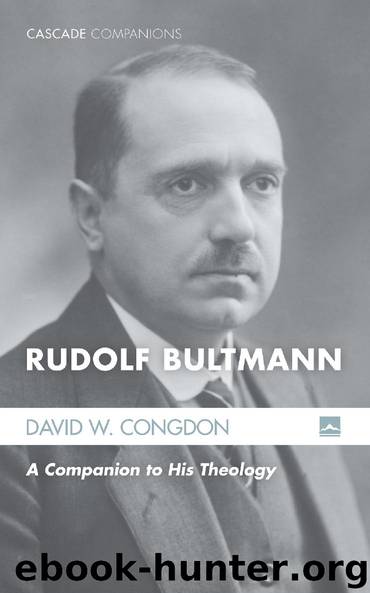Rudolf Bultmann: A Companion to His Theology (Cascade Companions) by Congdon David W

Author:Congdon, David W.
Language: eng
Format: epub
Publisher: Cascade Books
Published: 2016-01-25T00:00:00+00:00
125. For an excellent discussion of the kerygma within Bultmann’s New Testament theology, see Kay, Christus Praesens, 48–60.
126. The verb κηρύσσειν (kerussein, to proclaim) appears over sixty times in various forms, but this is a generic word referring to any act of proclaiming or preaching. The nominal form is more distinctive.
127. Ebeling, “Kerygma,” 516.
128. Bultmann and Heidegger, Briefwechsel, 186.
129. This is perhaps most strikingly illustrated in the Gospel of Mark, where the word only appears in the later addition of Mark 16:8: “And afterward Jesus himself sent out through them, from east to west, the sacred and imperishable proclamation of eternal salvation.” This suggests that the word is associated with the official church teaching regarding Christ as the messiah of God. Bultmann uses the word with this precise meaning in mind.
130. TNT, 1:3, 33.
131. Ibid., 1:3.
132. Ibid., 1:33.
133. In this early period, Christianity is best understood as a sect within Judaism in distinction from the developing rabbinic Judaism.
134. TNT, 1:34.
135. Ibid., 1:43.
136. See ibid., 1:293–94.
137. Ibid., 1:42.
138. Schmithals, “Nachwort,” 155.
139. Bultmann, “Christology,” 263.
140. Ibid.
141. Ibid., 267. Emphasis mine.
142. Ibid.
143. Ibid., 276–77.
144. Ibid., 279.
145. Ibid., 278.
146. See Congdon, “Trinitarian Shape,” 245–46.
147. Ebeling, “Kerygma,” 517.
148. See LW, 1:54.
149. Ebeling, Theology and Proclamation, 43; cf. Ebeling, “Word of God,” 313–14.
150. TNT, 1:307, rev.
151. The word “theology,” for Bultmann, is an umbrella category that includes everything from the theological claims in Paul’s epistles to church proclamation to the work of the systematic theologian.
152. Bultmann and Heidegger, Briefwechsel, 186.
153. CD 1.1:98–140.
154. Bultmann, “Christology,” 280–81, rev.
155. Bultmann, “New Testament,” 1.
156. TNT, 2:239, rev. This passage is from a 1950 essay on “The Problem of the Relation of Theology and Proclamation in the New Testament,” included as an epilogue to his Theology of the New Testament.
157. Bultmann and Heidegger, Briefwechsel, 186.
158. Bultmann, “Christology,” 280, rev.
159. Bultmann and Heidegger, Briefwechsel, 186.
160. As he says, “neither Paul’s theology and christology nor that of any other Christian thinker can be understood uncritically,” precisely because “every theological exposition of the saving event and of the Christian’s existence is constructed with the use of contemporary conceptions” (Bultmann, “Christology,” 279–80).
161. Rowe, “Kerygma,” 33; Meeks, “Problem,” 221.
162. Buri, “Entmythologisierung,” 85–101; Ogden, Christ, 110.
163. Bultmann, “Primitive Christian Kerygma,” 41, rev.
164. Bultmann, “Arier-Paragraph,” 365.
165. Bultmann, “On the Problem,” 112. Emphasis mine.
166. Bultmann, “Theology as Science,” 57.
167. Bultmann, “Problem of Hermeneutics,” 74.
168. Ibid., 75.
169. Bultmann, “Problem of ‘Natural Theology,’” 315.
170. Ibid., 317.
171. Bultmann, “Problem of Hermeneutics,” 87.
172. Bultmann, “Protestant Theology,” 333.
173. Ibid., 333–34.
174. Bultmann, “On the Problem,” 113.
175. There are similarities worth exploring between Bultmann and Karl Rahner’s concept of “anonymous Christian” and Dietrich Bonhoeffer’s concept of “unconscious Christianity.” For more on those latter views, see Kelly, “Unconscious Christianity.”
176. Bultmann, “Problem of ‘Natural Theology,’” 322.
177. Ibid.
178. Bultmann, we should note, was a firm opponent of every universalism, Christian or otherwise, because of the way universalisms speak in the abstract about humanity as such. For this reason, universalism is impossible on the soil of dialectical theology, at least as Bultmann understands it, which can only speak of God in connection to the concrete historicity of the person whom God affects and encounters.
Download
This site does not store any files on its server. We only index and link to content provided by other sites. Please contact the content providers to delete copyright contents if any and email us, we'll remove relevant links or contents immediately.
Ignatius Catholic Study Bible New Testament by Curtis Mitch & Scott Hahn(643)
Reading Mark by Dowd Sharyn(511)
The Resurrection of the Son of God by N. T. Wright(451)
The Lamb and the Seven-Sealed Scroll by Richard Booker(440)
The Source of Miracles by Kathleen McGowan(432)
Understanding Our Father: Biblical Reflections on the Lord's Prayer by Scott Hahn(390)
The New Cambridge History of the Bible: Volume 1, From the Beginnings to 600: 1 by James Carleton Paget & Joachim Schaper(343)
The New Testament as Literature: A Very Short Introduction (Very Short Introductions) by Kyle Keefer(338)
Insights on Romans by Charles R. Swindoll(329)
Anatomy of the Fourth Gospel by R. Alan Culpepper(314)
Three Gospels by REYNOLDS PRICE(312)
The New Cambridge History of the Bible: Volume 2, From 600 to 1450 by Richard Marsden & E. Ann Matter(310)
The Gospel According to Jesus by Mitchell Stephen(306)
An Introduction to the New Testament and the Origins of Christianity (Introduction to Religion) by Delbert Burkett(298)
Insights on John ~ 04 Swindoll's Living Insights New Testament Commentary by Charles R. Swindoll(298)
Insights on Galatians, Ephesians by Charles R. Swindoll(291)
James: Verse by Verse by Osborne Grant R(291)
The New King James Version by Arthur L. Farstad(291)
Finding Jesus at the Border by Julia Lambert Fogg(282)
